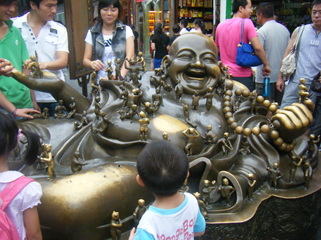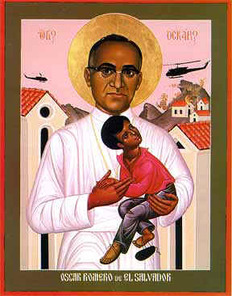
The Christian passage at first glance seemed so different. it wasn't really about fasting at all but about the temptations of Jesus when after having fasted for 40 days and 40 nights he was tempted to turn stones into bread to satisfy his hunger. There's no prescription to fast in the Christian scriptures though as a good Jew Jesus obviously did fast and even seemed to take it for granted that his followers would also fast. What Jesus does is tell his disciples how to fast - to do so privately and hiddenly and not parade it before other people, which is always a danger for religious ritual of any kind. As Jesus says this brings its own rewards.
For the Jews fasting is also prescriptive and Yom Kippur, the Day of Atonement would be regarded as the most solemn of fasts but the day is spent in the Synagogue and is a moment to ask for forgiveness for past sins and renewed commitment for the future. Again not eating is important but only a backdrop to a day of intense prayer and reflection. What was interesting was that the scripture passage we reflected on and which is read at Yom Kippur was from Isaiah. It reminded us that it's possible to have a wicked fast, that the kind of fast that God desires is to unburden the oppressed, feed the hungry, clothe the naked, look after the homeless. As so often happens in religion ritual is important but only if the intention is right.
I often think at events such as the scriptural reasoning one that Christianity appears quite wishy washy compared to Islam and Judaism which are more prescriptive. To say it's a religion of the heart doesn't satisfy those people for whom law is an expression of God's will. Lent compared to Ramadan or the Baha'i fast is so little but it too has its place. The passage about the temptations in the desert that we looked at this week was not really about abstaining from food and drink but about power - using power for our own ends, either to make life comfortable for us or to have our message heard and draw people to our projects. For Jesus this was not on - nothing was more important than listening to the Word of God, realising the giftedness of our lives, knowing that how we proceed should be with compassion and discernment, that living for the kingdom of God daily in small ways is better than grand gestures.
All of this has resonances in Pope Francis new encyclical in which he reminds us human beings of our relationship with the created world in which we live. He recognises the danger our world is in as a result of our greed and dominion over creation, our sense that it is there for our benefit and ease, our loss of the sacredness of all life. The encyclical had been leaked and the leaks seem to have brought about more criticism than the document did in its actual publication. A lot of the criticism came from mining companies and global warming deniers so it's not too hard to determine their motivation. Jed Bush, a presidential candidate and a catholic commented on it saying “I think religion ought to be about making us better as people and less about things that end up getting in the political realm.” I wonder what he meant by that. This came from a man who had lobbied for a change in abortion laws. Was this political? Is religion is about personal morality as long as it doesn't interfere with my settled life? And since morality and religious living are to do with values are they not intrinsically connected to politics? Obviously this encyclical has annoyed some people because it calls for a fast from the whole of humanity, a discipline that will stop us using the earth's resources for our own ends, a discipline that will help us rediscover our connectedness to the earth and a realisation that in killing our earth we are in fact killing ourselves. Future generations will be glad of that.





 RSS Feed
RSS Feed
